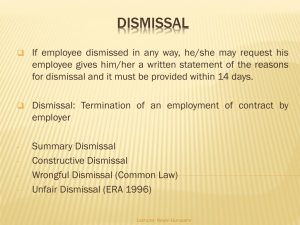Constructive Dismissal
Reasons for constructive dismissal vary from situation to situation and are designed to be fair to both parties. Constructive dismissal is an act by an employer or the employer’s legal representative that has more than likely made a decision based on purely personal factors, without considering the position or performance of the person concerned. An example of this might be a case where an employee has been late working on their shift for a week and is informed of this at a meeting the next day. They claim that it was not intentional and did not know what the other employees thoughts were regarding their poor performance, when in fact it was them who had deliberately designed the punishment.
Reasons for constructive dismissal may also arise where an employee feels that they are being negatively treated by their employer, whether this is formally or informally. These types of cases often centre around issues revolving around workload, communication, dress code, uniform, and work style. In many cases, constructive dismissal may occur if there is a pattern of this happening, where one employee is consistently treated badly and the other employee is still happy to work there. However, this should never be the case as the employer has to show that they have suffered enough from these poor working conditions to justify it.

Constructive dismissal can arise out of several reasons such as poor performance, requests for transferred to other departments, complaints about poor working conditions, disciplinary issues, and more. The most common reasons for a dismissal are poor performance, Transfer requests, disciplinary issues and complaints. Other reasons for this to happen include that an employee has not followed company policy, behaved unethically, or that the employee is complaining about their poor working conditions. Constructive dismissal is different from wrongful dismissal, as the latter relates to an employer failing to meet the employment law requirements. Where a person feels they have been unfairly dismissed, they can appeal to an Employment Tribunal which will determine if their dismissal was correct, unfair, or both.
Constructive Dismissal – Reasons For Constructive Dismissals
There are two main reasons for this type of dismissal; the first being that the employer has just made a decision to change certain aspects of their business and replace their employees with new ones who have less skills or who do not have the same senior level experience that is standard. The second reason is that the employee has actually complained about their working conditions and they have proof that they cannot continue working in this environment. Constructive dismissal is not an easy process, as the employer has to show that they have not made a decision to fire people without good reasons and that the employee’s complaints are valid.
The main reasons for a dismissal to occur is that an employee has been dealt with in a way that a reasonably intelligent person would view as unfair and that this treatment continues despite repeated requests to rectify the situation. The level of unfairness can differ significantly between cases, but it is important to remember that unfair treatment can take place even if the employee is not actually intending to complain about working conditions or benefits. Employers can still end up with a case where they have not followed the correct employment procedures and the employee continues to be unfairly treated. In this case they would have to consider what steps to take.
Constructive dismissal claims are usually won if an employee would have reasonably expected that they would be given a different level of salary or promotion on leaving their job. It is important to remember that the Fair Trading Act 1998 states that employers must always give employees reasonable notice of a proposed dismissal. This essentially means that if the employee would have expected to be given something different on leaving the job then they will have the right to bring a fair and appropriate case against their employer. In addition to these employers must always give proper notice before making any changes to their employment contracts.